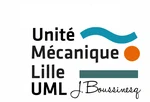PhD position on microplastics transport in upper-ocean turbulent flows
Université de Lille
Unité de Mécanique de Lille J. Boussinesq (UML), ULR 7512
Homepage: https://uml.univ-lille.fr
Context
Most plastics in the ocean break up into very small particles. These tiny plastic bits, which can be quite different in shape and weight, are collectively called microplastics. Microplastics are now widespread in the world oceans, representing a major source of marine pollution and a considerable threat to all ecological communities in the sea. Unlike larger debris, which can be easily seen, however, they are harder to detect. Oceanic flows move them around in a complex manner, making it difficult to track them. Indeed, close to the sea surface, ocean currents are characterized by turbulent dynamics, and typically present nonhomogenous circulation patterns both on the horizontal and on the vertical. Moreover, the mechanisms through which microplastics sink into deeper, more quiescent waters are still only poorly known. Therefore, it is presently challenging to predict where these small particles accumulate, and to provide a quantitative description of their depth concentration profiles.
The development of plastics removal strategies, and the design of marine protected areas, crucially require a detailed knowledge of the transport and dispersion properties of these material particles in the sea. The Lagrangian approach to their evolution in turbulent flows allows a fine description of both spatial and temporal features of the particle distribution at different scales. Therefore, it provides an ideal framework to test different model dynamics and to develop methodologies to characterize the spreading and aggregation processes of microplastics debris.
Work plan and goal
In this thesis we will explore the dynamics of particle-laden nonhomogeneous turbulent flows relevant for the upper ocean by means of numerical simulations. We will focus on sinking particles with different material properties, to characterize their mean vertical profiles and the formation of long-lived clusters. We will further address the determination of microplastics residence times in special flow regions, as for instance the well-mixed layer just below the surface. The research work will rely on simulations of turbulent flows with different degrees of complexity in terms of the nonhomogeneity of their horizontal and vertical structure, aiming to improve the oceanographic realism of the modeling framework. It will be based on state-of-the-art computational fluid dynamics techniques for particle-laden flows, and intensive data analysis. The goal is to identify the basic key mechanisms controlling microplastics transport in the sea, in order to determine accumulation hotspots and rates of sedimentation into the deep ocean, which may be informative for the development of parametrizations in realistic ocean simulations, and of strategies to protect the marine environment.
Research team
The PhD thesis (starting in October 2023) will be conducted at UML, Lille (France). It will benefit from an ongoing collaboration with G. Boffetta and S. Musacchio at Physics Department of Turin University (Italy) on the simulation of turbulent flows. For the modeling of oceanic flows, a collaboration with F. Schmitt and A. Sentchev at Laboratoire d’Océanologie et de Géosciences, Wimereux (France) is also planned.
Candidate
Candidate having good knowledge of fluid mechanics or dynamical systems and an interest for numerical methods; education: Master in Fluid Mechanics, Physics, Geophysical Fluid Dynamics, Applied Mathematics. Good knowledge of oral and written English is required. Knowing C, Fortran, or Python would be a plus.
Application
Interested candidates should send their CV, a letter of motivation, and contact information of two references.

